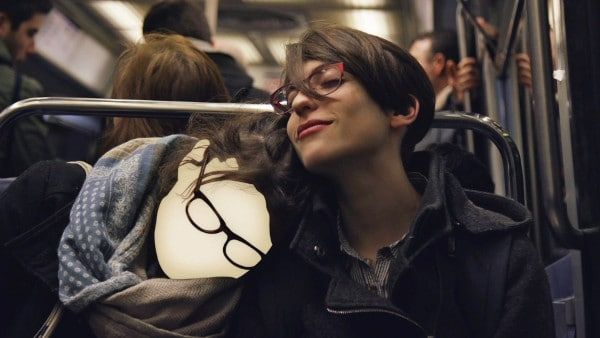Eye For Film >> Movies >> No Box For Me. An Intersex Story (2018) Film Review
No Box For Me. An Intersex Story
Reviewed by: Jane Fae

Stylish, insightful, charming, sweet. Bittersweet. Above all, informative, providing a view of intersex not often given: from the ground up, through the eyes of intersex people. No Box For Me: An Intersex Story is in part a tale of coming out, but even more, it is a tale of coming to terms with who you are. With what it means to be intersex. How that positions you relative to the rest of the world. How, at base, the rest of the world positions itself relative to you.
No Box For Me is documentary but light in touch and using music, art and conversation to allow you to learn by listening to what intersex people are saying to one another, rather than taking a more overtly didactic or polemic tone.

It opens with an intersex woman, identified only as M, seeking out a hotel room she once stayed in when she was seven. For her, it feels important to find her way back to her past because she is brimming with questions. Who is she? What has been done to her? She is traumatised by her past – a past in which medical professionals informed her parents that she was neither one thing nor another and that in order to make her 'normal' they needed to intervene, to operate, before she even learned to walk.
This theme, of choice denied, decisions made for another – even if with the best of intentions – is common to each of the stories that now unfolds as director Floriane Devigne provides space for a group of young intersex people to talk about themselves and to one another as the camera provides the lightest of light touches across the top.
There are no interviewers here to guide the conversations. No voice-overs telling the viewer where to look. The closest we get to this is a very brief segment as an intersex-friendly surgeon who has specialised in the treating of intersex people sets out his position. The problems, occasionally hinted at, here set out graphically, are not about being intersex so much as the single disastrous pathway – for many – dictated by the medical establishment and from there osmosed into the rest of society. Intervene early – before the child has a chance to know. Don't tell. Not the child. Not their friends or family (other than parents). Focus on the single most important outcome – for (male) clinicians – which seems to be not whether the person who comes out the other end of this process is happy or capable of love, but whether they can have sex. By which, obviously, is meant penis-in-vagina sex!
Most telling of all, he suggests, is the claim that early surgery is easier when the truth of the matter – young children's genitals are far smaller, far harder to operate on – is quite the opposite.
By nodding in, by not forcing the pace, this documentary allows intersex voices to be heard – in some cases for the first time. And it allows for difference to emerge. From the young intersex woman for whom it all worked out well – but who now believes that, even so, they should have waited, should have given her a choice - to the intersex academic, raised as a woman, now accepting her womanhood, but who hankers now and then after the boyhood, manhood she was denied.
What if she had wanted to be a boy?
Then there is M, who through the course of this documentary emerges slowly, stops hiding herself away - a change highlighted in the film by a shift from keeping her face and body blanked out to gradually filling in the details as she grows more comfortable with herself. And there is Pigeon, who emerged from agender to masculinity through a late testosterone-induced puberty. On the one hand, he celebrates his self-discovery: on t'other, he is angry, angry, angry at the doctors, as he sees it, who inflicted his life on him.
No Box For Me is subtle commentary on a doodle scrawled by one of the participants. Three tick boxes, labelled 'homme', 'femme' and 'fuck you' (it's a French film with English subtitles), and just the last box ticked. To be honest, it felt to me as though 'Homme, Femme, Fuck You' might have been a better, more explicit title for this documentary. But perhaps that would have engaged issues with the 9-o-clock watershed (or whenever the watershed cuts in in France).
This is a lovely documentary in which the viewer is invited to do nothing more strenuous than lean back and listen. Which, of course, is exactly what many in the intersex community ask that we do. Listen. And learn. And maybe, if we have the resource to do so, reach out and make the world a better, less binary-imposed space for intersex folks.
Reviewed on: 28 May 2019














